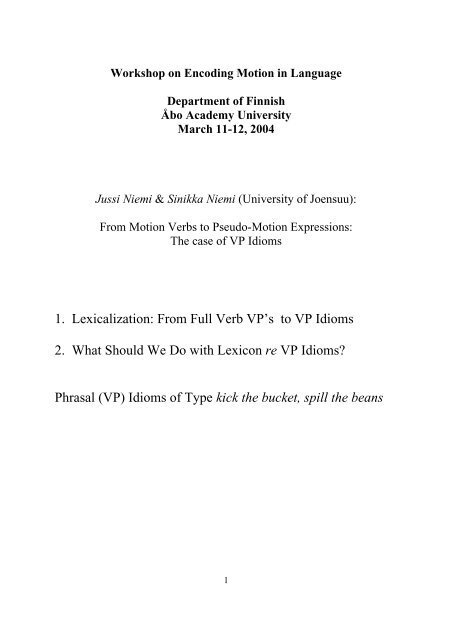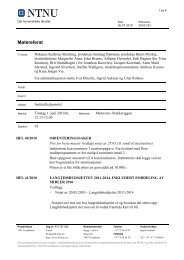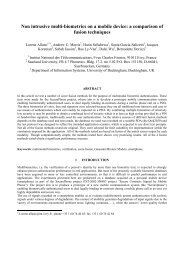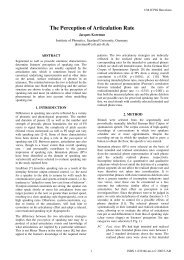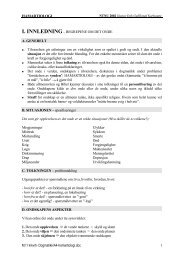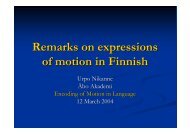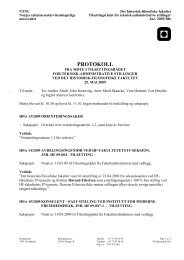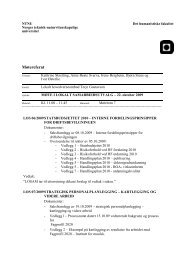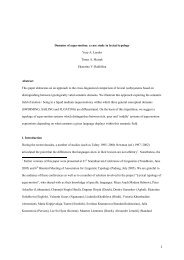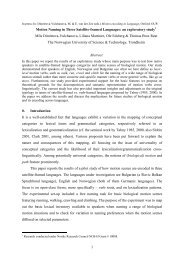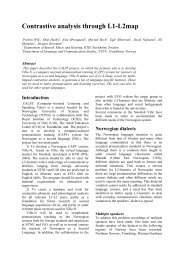The case of VP Idioms
The case of VP Idioms
The case of VP Idioms
You also want an ePaper? Increase the reach of your titles
YUMPU automatically turns print PDFs into web optimized ePapers that Google loves.
Workshop on Encoding Motion in Language<br />
Department <strong>of</strong> Finnish<br />
Åbo Academy University<br />
March 11-12, 2004<br />
Jussi Niemi & Sinikka Niemi (University <strong>of</strong> Joensuu):<br />
From Motion Verbs to Pseudo-Motion Expressions:<br />
<strong>The</strong> <strong>case</strong> <strong>of</strong> <strong>VP</strong> <strong>Idioms</strong><br />
1. Lexicalization: From Full Verb <strong>VP</strong>’s to <strong>VP</strong> <strong>Idioms</strong><br />
2. What Should We Do with Lexicon re <strong>VP</strong> <strong>Idioms</strong>?<br />
Phrasal (<strong>VP</strong>) <strong>Idioms</strong> <strong>of</strong> Type kick the bucket, spill the beans<br />
1
Contents<br />
1. Overall Lexicalization Path <strong>of</strong> <strong>VP</strong>’s<br />
2. Sidetrack: Grammaticalization and Lexicalization<br />
2.1 English <strong>VP</strong> <strong>Idioms</strong>, Or How You Can Drag-Ass and Give<br />
Good Studio<br />
2.2 <strong>The</strong> Case <strong>of</strong> the Finnish vetää ‘pull’, Or How You Can<br />
‘Pull Yourself to the Ground’ When You Just In Fact<br />
‘Fall’<br />
3. Phrasal <strong>Idioms</strong> as Lexical versus Syntactic Units: A<br />
Solution to a (Pseudo)Problem<br />
3.1 Phrasal <strong>Idioms</strong> As Lexical Expressions<br />
3.2 Phrasal <strong>Idioms</strong> As Syntactic Expressions<br />
3.3 A Way Out <strong>of</strong> Impasse: Idiom Processing At Lexicon/Grammar –<br />
Pragmatics Interface<br />
2
1. Lexicalization “Path”<br />
Four Stages <strong>of</strong> Lexicalization <strong>of</strong> EnglishV+N and V+N+P Structures<br />
Such as lose sight <strong>of</strong> (Akimoto 1995)<br />
Stage 1: Full Computation (e.g., “free syntax”, literal semantics)<br />
All the constituents are unrestricted (i.e., not indexed to their<br />
mates)<br />
Stage 2: Lexical Reanalysis (Reorganization)<br />
<strong>The</strong> noun becomes decategorialized (or rather, is demoted in the<br />
continuum <strong>of</strong> categoriality); it may lose some <strong>of</strong> its nominal<br />
features (e.g., number, definite article).<br />
<strong>The</strong> semantic relationship between the verb and preposition<br />
becomes fixed.<br />
Stage 3: Syntactic Reanalysis<br />
E.g., [lose] [sight <strong>of</strong> X] > [lose sight <strong>of</strong>] X<br />
Stage 4: Full Lexicalization<br />
*lose-sight-<strong>of</strong><br />
3
2. Sidetrack: Grammaticalization and Lexicalization<br />
Recent critique <strong>of</strong> classic views <strong>of</strong> grammaticalization (e.g., Lang.<br />
Sciences, 2001) where grammaticalization is seen as:<br />
a unidirectional (irreversible) process<br />
from (pragmatics/discourse to) syntax to morphology, or<br />
from grammatical to more grammatical expressions<br />
Newmeyer (2001):<br />
Grammaticalization as an epiphenomenon involving<br />
(a) structural re-analysis<br />
(b) semantic changes (bleaching)<br />
(c) phonological reduction<br />
Cf. lexicalization:<br />
(a) structural re-analysis:<br />
[lose] [sight <strong>of</strong> X] > [lose sight <strong>of</strong>] X<br />
(b) semantic changes: lose sight <strong>of</strong> ‘lose contact with’<br />
(c) phonological reduction: helluva (< hell <strong>of</strong> a) racket<br />
4
2.1 English <strong>VP</strong> <strong>Idioms</strong>, Or How You Can Drag-Ass<br />
and Give Good Studio<br />
Random House Dictionary <strong>of</strong> American Slang (ed. J. Lighter), Vol. I<br />
(A–G), 1994, Vol. II (H – O), 1997. NY: Random House.<br />
2.1.1 Development from drag SPEC ass to drag-ass V<br />
drag [(one’s)] ass (also: haul ass (1918-), haul tail (1924-), haul butt<br />
(1968-)) ‘to depart; go; proceed’<br />
1926 SPEC<br />
1934 no SPEC:<br />
But the minute things start getting tough you want to “drag arse”<br />
out.<br />
1937 SPEC<br />
1950 SPEC<br />
1953 SPEC<br />
1944-57 no SPEC:<br />
[…] he keeps right on goin’ when everyone else is draggin’ ass.<br />
1960 no SPEC:<br />
Time to drag ass back, Isolde.<br />
1963 no SPEC:<br />
He told them to drag ass, and you know they dragged?<br />
1968 SPEC<br />
1971 SPEC<br />
1974 SPEC<br />
1975 no SPEC<br />
1963-64:<br />
He drag-assed right upstairs. (Cf. haul-ass, v. 1958-)<br />
5
See also:<br />
bust a nut 1. Esp. Black E. a. (<strong>of</strong> either sex) to have an orgasm<br />
1938-1968: 6 occurrences, all with SPEC<br />
1975: He closed his eyes ... while he was bustin' nut.<br />
haul [pull] (one's) freight, 1. Esp. West. ‘to get moving; go; leave<br />
hurriedly’<br />
1885-1936: 10 quotes, all with specifiers<br />
1944-1970: 5 quotes, 2 w/ bare nouns<br />
6
2.1.2 Give Good Studio<br />
give head ‘to perform fellatio or cunnilingus’<br />
1941, dictionary-type entry:<br />
“Head. A generic noun or predicate nominative referring to<br />
fellator, as, e.g., “looking for head” Term reported from Montreal<br />
in 1940.”<br />
1956-1965: 4 instances, all with SPEC<br />
1968: 1st textual occurrence without SPEC (note quotation marks):<br />
A man who refuses to “give head to his woman” […] (Playboy)<br />
1976-1994 6 occurrences, all without SPEC<br />
7
give good, or great X (X = sg. count noun treated as mass noun) 'to<br />
be notable for X', 'to be notable for the use <strong>of</strong> or abilities with X' Used<br />
to generate usu. joc. nonce phr.., all reminiscent <strong>of</strong> (and patterned<br />
after) give head, exx:<br />
1971: give good belt<br />
1979: give great phone:<br />
How do you keep your job?<br />
I give great phone.<br />
1981: give great cactus<br />
1982: give great studio<br />
When she finished, the artist said, “You give great studio.”<br />
1991: give great spiel<br />
Rush [Limbaugh] gives great spiel. (Time)<br />
8
2.2 <strong>The</strong> Case <strong>of</strong> the Finnish vetää ’pull’, Or How<br />
You Can ‘Pull Yourself to the Ground’ When In<br />
Fact You Just ‘Fall’<br />
SKES/SSA<br />
vetää (as early as Agricola [C16]; frequent in dialects) ’transport,<br />
haul/drag, take (with oneself); suck away; pull out; make tense, tune;<br />
wring, attract; be big/large enough for’, etc.<br />
NSS<br />
vetää VI. 1. ‘stretch, make tense; to straighten, manufacture by<br />
tensing’<br />
[...]<br />
2. related to preceding as regards sound. a. ‘prolong articulation’<br />
Paunonen & Paunonen (2000)<br />
1920- ’copulate’ (tr.), e.g. Tenkku veti ... Lissuu ’Tenkku fucked<br />
Lissu’<br />
COPULATE (<strong>of</strong> men)<br />
Sex-related asymmetry, only male agents/subjects with vetää<br />
cf. structures with Patient complements, where the anatomy <strong>of</strong><br />
the COMP always refers to the female counterpart, e.g.<br />
vetää (X:ää) rusetti-in lit. ’pull (X) [X’s] bow tie-ILL’<br />
vetää (X:ää) viikse-en lit. ’pull (X) [X’s] moustache-ILL’<br />
vetää (X:ää) villa-an lit. ’pull (X) [X’s] wool-ILL’<br />
vetää reva-ksi/an lit. ’pull cunt-TRA/ILL’<br />
vetää tikit<br />
lit. ’pull stitches’<br />
9
INGEST<br />
1940- ’smoke’<br />
1960- ’eat’<br />
’drink alcohol’<br />
1980- ’to use drugs’<br />
Nowadays even “in other phrases” (Paunonen):<br />
vetää keikka-a<br />
lit. ’pull gig-PAR’,<br />
i.e., ’perform (‘do’!) a musical gig > job’<br />
Paunonen: ’steal’<br />
Perhaps extended from ’play an instrument using pulling motion or<br />
the sound <strong>of</strong> which is more or less continuous’ (SKES), which in turn<br />
is<br />
extended from ’prolong utterance/voice (e.g., in singing)’ (SKES)<br />
vetää ‘do/perform’ (cf. E. pull, as in pull a job, pull a fast one)<br />
vetää laata-t<br />
lit. ’pull floor tile–ACC:PL’, i.e. ’throw up, vomit’<br />
vetää [itsensä] keto-on lit. ’pull [oneself] field-ILL’, i.e. ’fall<br />
down (REFLEXIVE)’<br />
1. In falling (and vomiting), there is inherent movement.<br />
2. Fi. vetää (inter alia) ‘do, perform’<br />
Ergo: If a descriptive V+’landing site N’ phrase were needed, vetää<br />
would be the verb.<br />
10
Vetää, web pages:<br />
Mitä ne mulle räppää,<br />
What they me-to rap<br />
vetää mulle paskaa läppää<br />
pull me-to shit(ty) mouth (coll.), i.e., talk<br />
‘What are they rapping to me,<br />
talking shit to me’<br />
http://homokaasu.org/tarina/story.gas?id=59, date Feb. 18, 2004<br />
jereme rogers on vitun kova sekä koston<br />
Jereme Rogers is cunt’s tough and ?Koston<br />
joka kans vetää hulluja trikkejä<br />
who also pulls crazy tricks<br />
‘Jereme Rogers is a fucking tough [guy] and so is Koston who pulls<br />
crazy tricks’<br />
http://fi.rocsport.com/reviews/viewreviews.htm?ID=134, date<br />
Feb. 18, 2004<br />
joskus jotkut ihmiset vetää tappelun kamalan<br />
sometimes some people pull fight terrible<br />
‘Sometimes some people make a terrible fight.’<br />
http://:www.rakkausrunot.com/runoilija, date Feb. 18, 2004<br />
kasvain kasvaa kaulas, elämä vetää switch stancee<br />
tumor grows throat-in, life pulls switch stance<br />
‘A tumor grows in the throat, life does a Switch Stance’ (Switch<br />
Stance, a Michigan rap group)<br />
11
Avain: Yhdes iltaan (e.g., in Slangi.Net at:<br />
http://koti.mbnet.fi/joyhan/H3X.html), date Feb. 18, 2004<br />
12
A Synopsis <strong>of</strong> vetää and vetää idioms:<br />
vetää Meanings Time<br />
‘pull’, ‘prolong articulation’<br />
“old”, “established”<br />
*************************************************<br />
‘copulate’ [<strong>of</strong> men] 1920<br />
‘ingest’ ‘smoke’ 1940<br />
‘eat’<br />
‘drink alcohol’ 1960<br />
‘use drugs’ 1980<br />
w/ COMP: ‘perform/act’ 1980–<br />
e.g., ‘pull [a gig] (-> ‘steal’)<br />
‘vomit’, ‘talk’, ‘fall down’, ‘fight’<br />
13
3. Phrasal <strong>Idioms</strong> as Lexical versus Syntactic<br />
Units: A Solution to a (Pseudo) Problem<br />
Grammar<br />
Regularity<br />
Predictability<br />
Rule-governed Processes<br />
Computation<br />
Lexicon<br />
Irregularity/Idiosyncracy<br />
Arbitrariness<br />
Unit Access & Retrieval<br />
Storage<br />
Anomalies<br />
Suppletive inflection<br />
(e.g., go : went)<br />
“Productive” derivation<br />
(e.g., caritative -less, -tOn)<br />
syntactic freezes, collocations, constructions<br />
phrasal verbs like shut up, put down<br />
phrasal idioms like kick the bucket, spill the beans<br />
constructions like [twist]ing the [night] away<br />
14
3.1 Phrasal <strong>Idioms</strong> As Lexical Expressions<br />
Anomalies<br />
a. Idiomatic words are not paradigmatically free units (“words”).<br />
kick the bucket may mean ‘die’, while<br />
punt the bucket and<br />
kick the pail may not (?).<br />
b. Idiomatic interpretation is holistic.<br />
c. Idiomatic (content) words do not carry their literal readings<br />
d. Metaphoric interpretation (if any) arises from the whole idiom<br />
<strong>The</strong> content words spill and beans in spill the beans do not per<br />
se evoke ‘reveal’ and ‘secret’, respectively.<br />
e. Like other semi-fixed constructions, idioms may form “families”<br />
with a constrained range <strong>of</strong> lexical variation but with no<br />
(appreciable) semantic change (cf. radial categories).<br />
get/start/set the ball rolling<br />
f. Idiomatic isolates, e.g. F. mönkään, pälkähästä (Nenonen 2002)<br />
15
3.2 Phrasal <strong>Idioms</strong> As Syntactic Expressions<br />
Anomalies<br />
a. Narrow range <strong>of</strong> syntactic variation<br />
English: hierarchy <strong>of</strong> transformations/frozenness, Fraser 1970)<br />
1. Unrestricted<br />
2. Reconstitution (e.g., nominalization)<br />
3. Extraction (e.g., topicalization)<br />
4. Permutation (e.g., passivization)<br />
5. Insertion (e.g., addition <strong>of</strong> ADV)<br />
6. Adjunction (e.g. FIN > participle)<br />
7. Frozen<br />
Finnish: restrictions, no clear-cut hierarchy (Niemi et al. 1995,<br />
Nenonen 2002)<br />
Permissible Changes in Form/Idiom (N = 70)<br />
No. Changes Allowed No. <strong>Idioms</strong><br />
None 6<br />
1 6<br />
2 19<br />
3 15<br />
4 12<br />
6 7<br />
7 4<br />
8 1<br />
b. Asyntactic/ungrammatical form<br />
e.g., lose face, kick/haul/drag ass<br />
16
Niemi, S. (submitted)<br />
syntax <strong>of</strong> Swedish V + Object(like) N <strong>VP</strong>’s:<br />
1. Free phrases, e.g. träffa flickan ‘meet the-girl’<br />
2. Idiomatic <strong>VP</strong>’s with inflected noun complements, e.g., bryta isen<br />
‘relieve tension’, lit. ‘break the ice’<br />
3. <strong>VP</strong>’s with the so-called naked (count) nouns, e.g., röka pipa ‘be a<br />
pipe-smoker’, lit. ‘smoke [no article] pipe’<br />
4. <strong>VP</strong>’s with mass noun complements using the same verbs as in (3),<br />
e.g., röka hasch ‘smoke hashish’<br />
5. <strong>VP</strong>’s with metonymically used complement nouns, e.g., spela Bach<br />
‘play [music composed by] Bach’<br />
17
100<br />
90<br />
80<br />
70<br />
60<br />
50<br />
Free <strong>VP</strong>'s<br />
<strong>VP</strong> idioms w/ inflected nouns<br />
<strong>VP</strong>'s w/ naked count nouns<br />
<strong>VP</strong>'s w/mass nouns<br />
<strong>VP</strong>'s w/metonymic nouns<br />
18
3.3 A Way Out <strong>of</strong> Impasse: Idiom Processing At<br />
Lexicon/Grammar – Pragmatics Interface<br />
Preparatory Observations<br />
Processual Autonomy <strong>of</strong> Lexicon<br />
Lexical decision with semantic priming<br />
In the corner <strong>of</strong> the ro<strong>of</strong> the man saw roaches, spiders and other bugs.<br />
bug ‘concealed microphone’<br />
‘insect’<br />
[...] roaches, spiders and other bugs. ANT<br />
MIKE<br />
Both literal and idiomatic readings are activated in normals in<br />
immediate testing; a few seconds later: only appropriate pairing<br />
facilitated (here: bug -> ant).<br />
Ergo: In perception, lexicon is autonomous (for a brief moment).<br />
19
Right-hemisphere aphasic patients perform inadequately with<br />
idioms in <strong>of</strong>f-line tasks, but not in online tasks (word-monitoring,<br />
with idiomatic readings faster) (Tompkins et al. 1992).<br />
Alzheimer patients do access both literal and idiomatic meanings but<br />
they are unable to suppress literal meanings in <strong>of</strong>f-line<br />
comprehension tasks, (Papagno et al. 2003).<br />
Redundancy (morphology & lexicon: dual route models)<br />
Post-lexical and post-grammatical suppression<br />
Interface with pragmatics/world knowledge<br />
Leave Your Lexicon Alone!<br />
And Remember James McCawley!<br />
20


